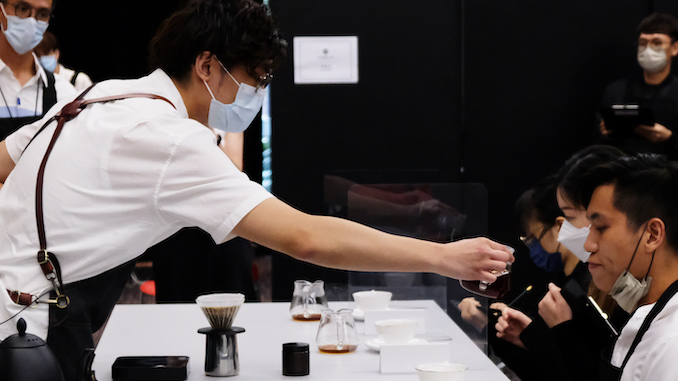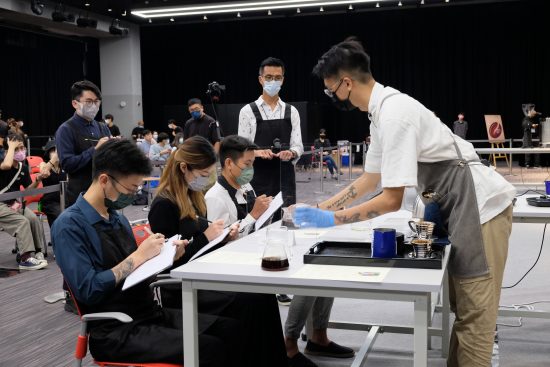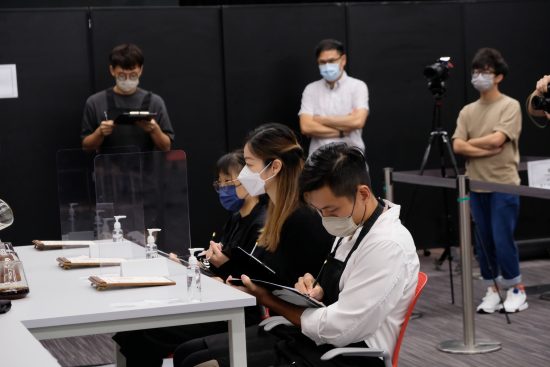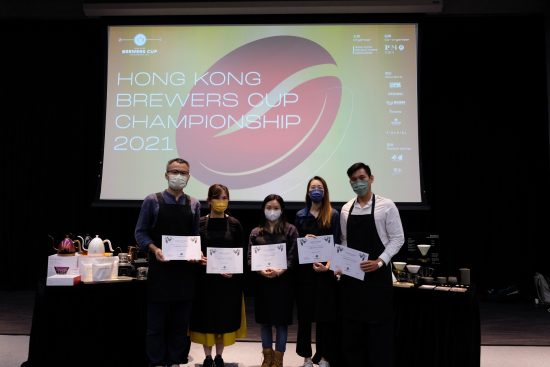
We talk to the co-founder of Urban Coffee Roaster about stepping outside the café and taking on the role of sensory judge in the recent 2021 Hong Kong Brewers Cup Championship.
BY TIGGER CHATURABUL
SPECIAL TO BARISTA MAGAZINE ONLINE
Photos courtesy of Hong Kong Specialty Coffee Association
On June 23-24 and 27-29, the Hong Kong Specialty Coffee Association (HKSCA) brought back the Hong Kong Brewers Cup Championship (HKBrC) after a two-year hiatus due to political unrest and the pandemic. This year’s competition was immediately preceded by an intensive judges’ workshop to select a group of carefully calibrated coffee professionals to be on the judging team. The workshop included a seminar presentation, followed by a written and sensory test, plus a mock competition round.
Gary Au (he/him), co-founder of Urban Coffee Roaster (UCR), is no stranger to judging coffee and competitions, including the Hong Kong AeroPress Championship and Hong Kong Barista Championship. However, it was Gary’s first time judging Brewers Cup this year, and he shares the perks and challenges of being a sensory judge, as well as how he takes the role further to learn about Hong Kong’s larger coffee scene.

Tigger Chaturabul: Hey Gary, thanks for taking the time to share your experience in the relatively unknown world of judging coffee competitions. We always hear a lot from the competitor’s point of view, so it’s fascinating to know more about what goes on inside the mysterious “judges’ room.” Could you tell me a little bit about your coffee journey and what made you want to become a judge in the first place?
Gary Au: I started UCR in 2014 with my other co-founders as a retail coffee business, but we ended up collaborating with a local hostel owner and opened our first coffee shop at the same time. Now we have three locations around Hong Kong, and one of my proudest achievements was going to Ethiopia in 2017 to directly source and trade coffee ourselves. That first trip included sourcing competition lots as well as bigger lots for our stable large-scale production supply. It might not sound like a huge deal, but for me, it was a significant milestone.
Becoming a judge is a great way to experience different ways to assess coffee. At the same time, you’re participating on one of the biggest stages in the industry, where a lot of cutting-edge things happen. Every year, there are always new updates in specialty coffee, and when you’re a judge, you get to see what kinds of techniques the competitors are using up close. Then, after you experience all that yourself, you can go back and share what you’ve learned with your own team.
Can you tell me about your experience at the judges’ workshop for HKBrC? What were some highlights or challenges, and did you do anything to prepare for it?
The workshop was really interesting because it was so comprehensive. Besides the initial seminar briefing covering the rules and regulations, there was also a written test and sensory test. Although we could study the rules to prepare for the written test, it was difficult because we didn’t know how to answer the questions in a way that would award us the most points. Luckily I passed, but I felt it was pretty challenging. The best way you can prepare for it is to really study the rules and regulations a day or two before the workshop.
For the sensory part, we only had a short time to assess, make a decision, and write comments. (In one test, they were given three coffees to evaluate and had to choose the best one. In another, they were given two coffees and had to identify the better one with supporting reasons.) In a normal cupping procedure, it would be very simple, but due to the intensity of the workshop and the tight time allowance we had for each part, it was pretty difficult.

You were on the judging team from the first preliminary round to the very last finalist round. How was your overall experience as a sensory judge for the 2021 HKBrC? Was there anything that surprised you?
Every morning, the judges would meet at the competition venue at 8:30 a.m. (Except for that one day when we had a black rainstorm warning and delayed everything by an hour.) We shared a morning calibration coffee together at 9 a.m. and got ready for the first competitor’s presentation by 9:30 a.m. I was mindful to keep my sensory palate clear and avoided some foods I usually enjoy, like spicy and strongly flavored dishes.
Everything was really great from beginning to end. There were some competitors who, from the preliminary to the semi-final and to the final round, really made improvements in their presentation even though everything happened in such a short time. I could see they put a lot of thought into how to improve their performances and brewing techniques in hopes that they could get the best results. I learned a lot from them, and their diligence really impressed me.
As someone who also competes in coffee competitions, I sometimes struggle between trying to score more points or focusing more on my presentation flow. However, during the 2021 HKBrC, I saw some competitors find new ways to score higher points in their presentations, and I learned there are ways to do both at the same time very well.
I was a little surprised by how many people registered for the judges’ workshop (80+) and BrC (40). But, other than that, everything was pretty much within my expectations, and even wearing a mask throughout the entire competition didn’t particularly affect me at all.
What advice do you have for people who want to become sensory judges or join Brewers Cup competitions?
My advice to those who want to be judges is to drink more coffee, but with every sip you take, try to set an intention for evaluation. The most challenging part of being a sensory judge is giving scores and writing comments to support those scores in a very short time. These comments are really important to let the competitor know what they’re doing well or not so well and keep the whole judging system fair. You’re also allowing the competitor to understand what they can do to improve next time. But you always have to keep in mind you have very little time to assess everything.
On the scoresheet, you also need to assess the coffee when it’s hot, warm, and cold, and the temperature of the cup changes really quickly too. Therefore, you have to hurry up and drink, sense what you’re drinking, and evaluate with comments. If you usually participate in cupping sessions, those are good times to train for this process.
For potential competitors, my advice is to also try more coffee, especially different ones. One of the more difficult parts of BrC is the compulsory brewing section, where everyone brews the same sponsored coffee using their own techniques. It’s tough because you can’t really prepare for it beforehand. But if you’re used to trying new coffee beans regularly and finding the best ways to brew them, you can improve your skill.
A lot of the time, competitors will focus a lot on preparing for the open service round and thinking about what beans to present. But it’s essential to also spend more time training for the compulsory round. For this year’s HKBrC, I feel like the compulsory round was really the deciding factor when it came to winning the competition, so for next time, competitors should put more effort into preparing for it.

What is the best thing about being a sensory judge? Is there anything you can share that people may not usually know about this role?
There are a lot of great things about being a sensory judge. You get to drink a lot of competition-quality coffee, for starters. But, for me, the best part is getting a better understanding of what’s going on throughout the entire industry.
Every barista or competitor is really bringing their own story to the stage. These stories are usually influenced by what they’ve experienced at their coffee shops, maybe by the kinds of customers they face or the different coffee knowledge they learn. When they’re on stage, you get to experience a piece of what they go through daily. As a judge, you get to see many different competitors and listen to a lot of different stories, and that’s how you find out what’s new and the latest updates in the industry.
A lot of the time, as coffee professionals, we spend the entire day in our own coffee shops and only come into contact with the people from our surrounding community, so maybe we don’t get a very comprehensive picture of how the overall industry is doing. But when you’re a sensory judge, you get to drink a lot of different coffees and watch a variety of presentations, and you get to see what’s going on in the big picture. So for me, this is probably the biggest benefit of being a sensory judge.

ABOUT THE AUTHOR
Tigger Chaturabul (she/her) tried to be a barista for two years until she realized she was better suited behind the business than behind the bar. She now runs her own copywriting and design studio, Curious Typhoon Studio, that serves F&B and other small businesses in Hong Kong. Her free-range creative lifestyle allows her to spend all her time in coffee shops everywhere.

